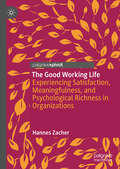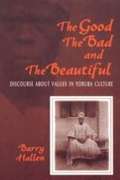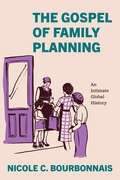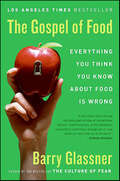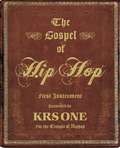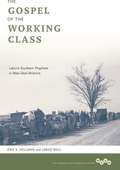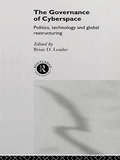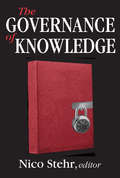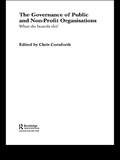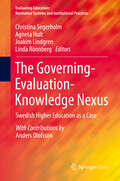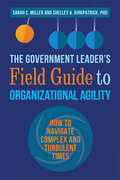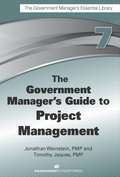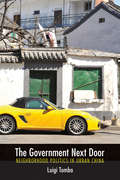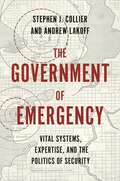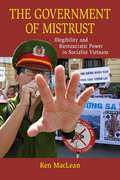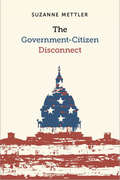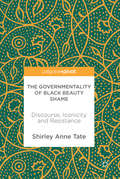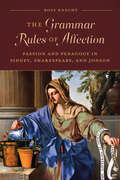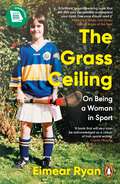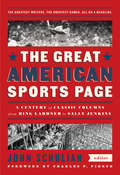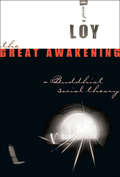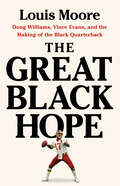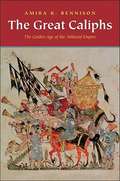- Table View
- List View
The Good Working Life: Experiencing Satisfaction, Meaningfulness, and Psychological Richness in Organizations
by Hannes ZacherThis book adapts the ancient philosophical notion of the “good life” to the context of modern work and organizations. It outlines a vision of the good working life as the simultaneous experience of high levels of job satisfaction, work meaningfulness, and work psychological richness. In the chapters, these three dimensions of the good working life are related to various individual differences, such as demographic and personality characteristics, as well as different work characteristics, including job demands and job resources. The three dimensions of the good working life are also analysed across different industries, and differentially related to important work outcomes, such as job engagement, performance, and occupational health, as well as key life outcomes, including life satisfaction, health, societal contributions, and wisdom. Promoting a positive psychological perspective on work, this book offers a compelling read for academics, students, and practitioners interested in improving employee wellbeing and reducing stress in organizations.
The Good, The Bad, And The Beautiful: Discourse About Values In Yoruba Culture
by Barry HallenIn Yoruba culture, morality and moral values are intimately linked to aesthetics. The purest expression of beauty, at least for human beings, is to possess good moral character. But how is moral character judged? How do actions, and especially words, reveal good moral character in a culture that is still significantly based on oral tradition? In this original and intimate look at Yoruba culture, Barry Hallen asks the Yoruba onisegun―the wisest and most accomplished herbalists or traditional healers, individuals justly reputed to be well versed in Yoruba thought and expression―what it means to be good and beautiful. Posed as an outsider wanting to gain understanding of how to speak Yoruba correctly, Hallen engages the onisegun and has them explain the subtleties and intricacies of Yoruba language use and the philosophy behind particular word choices. Their instructions reveal a striking and profound depiction of Yoruba aesthetic and ethical thought. The detailed interpretations of everyday language that Hallen supplies challenge prevailing Western views that African thought is nothing more than acquiescence to long-established religious or communal values. The philosophy of ordinary language reveals that moral reflection is indeed individual and that evaluations of action and character take place on the basis of clearly and logically delineated criteria. With the onisegun as his guides, Hallen identifies the priorities of Yoruba philosophy and culture through everyday expression and shows that there are rational pathways to both truth and beauty.
The Gospel of Family Planning: An Intimate Global History
by Nicole C. BourbonnaisAn engaging, insightful history of the family planning movement and its connection to broader social and political developments across the globe. In the twentieth century, the idea that people should consciously plan (and limit) the size of their families became a global cause. Historical accounts of the global family planning movement have largely focused on the most prominent activists and those at the helm of international organizations, philanthropic foundations, and government programs. In The Gospel of Family Planning, however, historian Nicole C. Bourbonnais shifts our attention to frontline workers—doctors, social workers, nurses, fieldworkers, consultants, church groups, and volunteers—who, she compellingly shows, played a central (if complicated) role in preaching contraception around the world. Through a mix of collective biography and microhistory, Bourbonnais visits clinics, doorsteps, and bedrooms, revealing the everyday, ground-level workings of grassroots family planning campaigns, state population control programs, and the movements for reproductive rights and justice that arose to contest them. Throughout the book, Bourbonnais invites readers to consider how the intertwined histories of missionary work, humanitarianism, feminism, decolonization, and international development shaped intimate interventions into people’s reproductive lives around the world.
The Gospel of Food: Why We Should Stop Worrying and Enjoy What We Eat
by Barry GlassnerFor many Americans, eating is a religion. We worship at the temples of celebrity chefs. We raise our children to believe that certain foods are good and others are bad. We believe that if we eat the right foods, we will live longer, and if we eat in the right places, we will raise our social status. Yet what we believe to be true about food is, in fact, quite contradictory.Part exposé, part social commentary, The Gospel of Food is a rallying cry to abandon the fads and fallacies in favor of calmer, more pleasurable eating. By interviewing chefs, food chemists, nutritionists, and restaurant critics about the way we eat, sociologist Barry Glassner helps us recognize the myths, half-truths, and guilt trips they promulgate, and liberates us for greater joy at the table.
The Gospel of Hip Hop: The First Instrument
by Krs OneThe Gospel of Hip Hop: First Instrument, the first book from theI Am Hip Hop, is the philosophical masterwork of KRS ONE. Set in the format of the Christian Bible, this 800-plus-page opus is a life-guide manual for members of Hip Hop Kulture that combines classic philosophy with faith and practical knowledge for a fascinating, in-depth exploration of Hip Hop as a life path. Known as “The Teacha,” KRS ONE developed his unique outlook as a homeless teen in Brooklyn, New York, engaging his philosophy of self-creation to become one of the most respected emcees in Hip Hop history. Respected as Hip Hop’s true steward, KRS ONE painstakingly details the development of the culture and the ways in which we, as “Hiphoppas,” can and should preserve its future. "The Teacha" also discusses the origination of Hip Hop Kulture and relays specific instances in history wherein one can discover the same spirit and ideas that are at the core of Hip Hop’s current manifestation. He explains Hip Hop down to the actual meaning and linguistic history of the words “hip” and “hop,” and describes the ways in which "Hiphoppas" can change their current circumstances to create a future that incorporates Health, Love, Awareness, and Wealth (H-LAW). Committed to fervently promoting self-reliance, dedicated study, peace, unity, and truth, The "Teacha" has drawn both criticism and worship from within and from outside of Hip Hop Kulture. In this beautifully written, inspiring book, KRS ONE shines the light of truth, from his own empirical research over a 14-year period, into the fascinating world of Hip Hop.
The Gospel of the Working Class: Labor's Southern Prophets in New Deal America
by Erik S. Gellman Jarod RollIn this exceptional dual biography and cultural history, Erik S. Gellman and Jarod Roll trace the influence of two southern activist preachers, one black and one white, who used their ministry to organize the working class in the 1930s and 1940s across lines of gender, race, and geography. Owen Whitfield and Claude Williams, along with their wives Zella Whitfield and Joyce Williams, drew on their bedrock religious beliefs to stir ordinary men and women to demand social and economic justice in the eras of the Great Depression, New Deal, and Second World War. Williams and Whitfield preached a working-class gospel rooted in the American creed that hard, productive work entitled people to a decent standard of living. Gellman and Roll detail how the two preachers galvanized thousands of farm and industrial workers for the Southern Tenant Farmers Union and the Congress of Industrial Organizations. They also link the activism of the 1930s and 1940s to that of the 1960s and emphasize the central role of the ministers' wives, with whom they established the People's Institute for Applied Religion. This detailed narrative illuminates a cast of characters who became the two couples' closest allies in coordinating a complex network of activists that transcended Jim Crow racial divisions, blurring conventional categories and boundaries to help black and white workers make better lives. In chronicling the shifting contexts of the actions of Whitfield and Williams, The Gospel of the Working Class situates Christian theology within the struggles of some of America's most downtrodden workers, transforming the dominant narratives of the era and offering a fresh view of the promise and instability of religion and civil rights unionism.
The Governance of Active Welfare States in Europe
by Rik Van Berkel Willibrord De Graaf Tomas SirovatkaDuring the last decade, many European countries introduced extensive reforms to the way that income protection and activation programmes for the unemployed are implemented and delivered. This book analyzes and compares these reforms in nine European countries, focusing on the reforms programmes themselves, as well as on their effects.
The Governance of Cyberspace: Politics, Technology and Global Restructuring
by Brian D. LoaderIssues of surveillance, control and privacy in relation to the internet are coming to the fore as a result of state concern with security, crime and economic advantage. Through an exploration of emerging debates regarding the possible desirability, form and agencies responsible for the regulation of the internet and an analysis of issues of surveillance, control, rights and privacy, The Governance of Cyberspace develops contemporary theories and considers issues of access, equity and economic advancement.The Governance of Cyberspace encourages a more informed discussion about the nature of the changes which the new information and communications technologies (ICTs) are heralding in and will be of considerable interest to all those who are concerned about the technological shaping of our political future.
The Governance of Knowledge
by Nico StehrSocial surveillance and regulation of knowledge will be one of the most important issues in the near future, one that will give rise to unending controversy. In The Governance of Knowledge, Nico Stehr predicts that such concerns will create a new political field, namely, knowledge policy, which will entail regulating dissemination of the anticipated results of rapidly increasing knowledge. The number and range of institutionalized standards for monitoring new knowledge has hitherto been relatively small. Only in cases of technological applications has social control, in the form of political regulation, so far intervened. All modern societies today have complex regulations and extensive concerns with the registration, licensing, testing, and monitoring of pharmaceutical products. The increasingly important and extensive area of intellectual property legislation and administration is an example of social control in which certain measures selectively determine the use of scientific finds and technical knowledge. The Governance of Knowledge assembles a range of essays that attempt to explore the new field of knowledge politics for the first time. It is divided into four parts: The Emergence of Knowledge Politics: Origins, Context, and Consequences; Major Social Institutions and Knowledge Politics; Case Studies on the Governance of Knowledge; and Issues in Knowledge Politics as a New Political Field. Individual chapters concern the emergence of knowledge policy, the embeddedness of such regulations in major social institutions, and offer case studies of the governance of knowledge and discuss controversial issues that are bound to accompany efforts to regulate new knowledge. Professionals and graduate students in the fields of scoiology, political science, social science, and law, including policymakers and natural scientists, will find this book extremely informative.
The Governance of Public and Non-Profit Organizations
by Chris CornforthGoverning boards play a crucial role in ensuring that public and non-profit organizations are publicly accountable and perform well. Until now, there have been relatively few detailed empirical studies of what boards do in practice, but this book fills that gap by bringing together analyses based upon some of the best recent empirical studies.Using
The Governance of the Countryside
by Ian HodgeConflicts over the conservation of biodiversity, changing patterns in land use, pollution, climate change, public access and increasing demands for food and energy security lead to the creation of policies designed to reconcile interests and promote society's objectives. This book examines the origins and evolution of the institutions that determine the use and management of land and the delivery of ecosystem services, through private property rights, markets and public policies. Divided into five accessible parts, the book provides detailed coverage of the institutions, property and governance of the countryside, historical models, governance under sectoral policies and alternative approaches. It is carefully developed to meet the needs of anyone studying or interested in agricultural sciences, countryside management, rural environment and geography. Students, lecturers, policy makers, managers and consultants in these areas will find this a valuable resource.
The Governing-Evaluation-Knowledge Nexus: Swedish Higher Education as a Case (Evaluating Education: Normative Systems and Institutional Practices)
by Anders OlofssonThis Open Access book analyses the interplay between governing, evaluation and knowledge with an empirical focus on Swedish higher education. It investigates the origins, logics, and mechanisms of evaluation and quality assurance reforms and their dynamic interactions with institutional, national and European policy contexts. The chapters report findings from extensive empirical studies that offer detailed insight into the work of governing in higher education, by giving voice to actors at various levels and positions including the ministry, national agency and University employees. Central themes include the influence of European policy, changing system designs, media relations and quality assurance enactments in University institutions. The book also explores the ways in which an emerging professional cadre, labelled qualocrats, enacts and mediates evaluation and quality assurance policy and practice. Taken together, the expanding evaluation machinery in Swedish higher education highlights the pivotal role of knowledge as a governing resource, and points to special features of evaluation as a particular form of practice that makes knowledge work for governing.
The Government Leader's Field Guide to Organizational Agility: How to Navigate Complex and Turbulent Times
by Sarah C. Miller Shelley KirkpatrickThis is the first book to fully adapt the principles of agility for government leaders who want to make their organizations more effective and nimble while better serving their public mission.This practical resource will equip government leaders at all levels with evidence-based, hands-on guidance for transforming their organizations, enabling them to better serve the public and their customers. While many books focus on organizational agility for leaders of for-profit companies, this is the first one tailored to the unique requirements government leaders face. They must find a way to accomplish their mission while navigating constant change. Government leaders at all levels must maneuver their organizations through new, often complex challenges, ranging from new laws that impact their agencies, new technologies, changes in leadership, and unexpected events. By explaining how to manage and organize work differently, this guide will help leaders weather the storm of that constant change so they can help their agencies realize their missions and serve the public interest.
The Government Manager's Guide to Project Management
by Jonathan Weinstein PMP Timothy Jacques PMPThis realistic cross-section of the project management discipline in the federal arena will help anyone leading, working on, or affecting the direction of a project team. It covers the entire scope of project management from organization to methodology, technology to leadership. This volume focuses on the three project management organizational dimensions of culture, systems, and structure. Federal practices and successes in the areas of communication, project leadership, stakeholders, and key competencies are highlighted. The book offers clear and practical advice drawn from a variety of project management successes in the federal arena.
The Government Next Door: Neighborhood Politics in Urban China
by Luigi TombaChinese residential communities are places of intense governing and an arena of active political engagement between state and society. In The Government Next Door, Luigi Tomba investigates how the goals of a government consolidated in a distant authority materialize in citizens' everyday lives. Chinese neighborhoods reveal much about the changing nature of governing practices in the country. Government action is driven by the need to preserve social and political stability, but such priorities must adapt to the progressive privatization of urban residential space and an increasingly complex set of societal forces. Tomba's vivid ethnographic accounts of neighborhood life and politics in Beijing, Shenyang, and Chengdu depict how such local "translation" of government priorities takes place. Tomba reveals how different clusters of residential space are governed more or less intensely depending on the residents' social status; how disgruntled communities with high unemployment are still managed with the pastoral strategies typical of the socialist tradition, while high-income neighbors are allowed greater autonomy in exchange for a greater concern for social order. Conflicts are contained by the gated structures of the neighborhoods to prevent systemic challenges to the government, and middle-class lifestyles have become exemplars of a new, responsible form of citizenship. At times of conflict and in daily interactions, the penetration of the state discourse about social stability becomes clear.
The Government of Emergency: Vital Systems, Expertise, and the Politics of Security (Princeton Studies in Culture and Technology #28)
by Stephen J. Collier Andrew LakoffThe origins and development of the modern American emergency stateFrom pandemic disease, to the disasters associated with global warming, to cyberattacks, today we face an increasing array of catastrophic threats. It is striking that, despite the diversity of these threats, experts and officials approach them in common terms: as future events that threaten to disrupt the vital, vulnerable systems upon which modern life depends.The Government of Emergency tells the story of how this now taken-for-granted way of understanding and managing emergencies arose. Amid the Great Depression, World War II, and the Cold War, an array of experts and officials working in obscure government offices developed a new understanding of the nation as a complex of vital, vulnerable systems. They invented technical and administrative devices to mitigate the nation’s vulnerability, and organized a distinctive form of emergency government that would make it possible to prepare for and manage potentially catastrophic events.Through these conceptual and technical inventions, Stephen Collier and Andrew Lakoff argue, vulnerability was defined as a particular kind of problem, one that continues to structure the approach of experts, officials, and policymakers to future emergencies.
The Government of Mistrust
by Ken MacleanFocusing on the creation and misuse of government documents in Vietnam since the 1920s, "The Government of Mistrust" reveals how profoundly the dynamics of bureaucracy have affected Vietnamese efforts to build a socialist society. In examining the flurries of paperwork and directives that moved back and forth between high- and low-level officials, Ken MacLean underscores a paradox: in trying to gather accurate information about the realities of life in rural areas, and thus better govern from Hanoi, the Vietnamese central government employed strategies that actually made the state increasingly illegible to itself. MacLean exposes a falsified world existing largely on paper. As high-level officials attempted to execute centralized planning via decrees, procedures, questionnaires, and audits, low-level officials and peasants used their own strategies to solve local problems. To obtain hoped-for aid from the central government, locals overstated their needs and underreported the resources they actually possessed. Higher-ups attempted to re-establish centralized control and legibility by creating yet more bureaucratic procedures. Amidst the resulting mistrust and ambiguity, many low-level officials were able to engage in strategic action and tactical maneuvering that have shaped socialism in Vietnam in surprising ways.
The Government-Citizen Disconnect
by Suzanne MettlerAmericans’ relationship to the federal government is paradoxical. Polls show that public opinion regarding the government has plummeted to all-time lows, with only one in five saying they trust the government or believe that it operates in their interest. Yet, at the same time, more Americans than ever benefit from some form of government social provision. Political scientist Suzanne Mettler calls this growing gulf between people’s perceptions of government and the actual role it plays in their lives the "government-citizen disconnect." In The Government-Citizen Disconnect, she explores the rise of this phenomenon and its implications for policymaking and politics. Drawing from original survey data which probed Americans’ experiences of 21 federal social policies -- such as food stamps, Social Security, Medicaid, and the home mortgage interest deduction -- Mettler shows that 96 percent of adults have received benefits from at least one of them, and that the average person has utilized five. Overall usage rates transcend social, economic, and political divisions, and most Americans report positive experiences of their policy experiences. However, the fact that they have benefited from these policies has little positive effect on people’s attitudes toward government. Mettler finds that shared identities and group affiliations, as well as ideological forces, are more powerful and consistent influences. In particular, those who oppose welfare tend to extrapolate their unfavorable views of it to government in general. Deep antipathy toward the government has emerged as the result of a conservative movement that has waged a war on social welfare policies for over forty years, even as economic inequality and benefit use have increased. Mettler finds that voting patterns exacerbate the government-citizen disconnect, as those holding positive views of federal programs and supporting expanded benefits have lower rates of political participation than those holding more hostile views of the government. As a result, the loudest political voice belongs to those who have benefited from policies but who give government little credit for their economic well-being, seeing their success more as a matter of their own deservingness. This contributes to the election of politicians who advocate cutting federal social programs. According to Mettler, the government-citizen disconnect frays the bonds of representative government and democracy. The Government-Citizen Disconnect illuminates a paradox that increasingly shapes American politics. Mettler's examination of hostility toward government at a time when most Americans will at some point rely on the social benefits it provides helps us better understand the roots of today's fractious political climate.
The Governmentality of Black Beauty Shame
by Shirley Anne TateThis book uses the experiences and conversations of Black British women as a lens to examine the impact of discourses surrounding Black beauty shame. Black beauty shame exists within racialized societies which situate white beauty as iconic, and as a result produce Black ‘ugliness’ as a counterpoint. At the same time, Black Nationalist discourses present Black-white ‘mixed race’ women as bodies out of place within the Black community. In the examples analysed within the book, women disidentify from both the iconicities of white beauty and the discourses of Black Nationalist darker-skinned beauty, negating both ideals. This demonstration of Foucaldian counter-conduct can be read as a form of disalienation from the governmentality of Black beauty shame. This fascinating volume will be of interest to students and scholars of Black identity, Black beauty and discourse analysis.
The Grammar Rules of Affection: Passion and Pedagogy in Sidney, Shakespeare, and Jonson
by Ross KnechtRenaissance writers habitually drew upon the idioms and images of the schoolroom in their depictions of emotional experience. Memorable instances of this tendency include the representation of love as a schoolroom exercise conducted under the disciplinary gaze of the mistress, melancholy as a process of gradual decline like the declension of the noun, and courtship as a practice in which the participants are arranged like the parts of speech in a sentence. The Grammar Rules of Affection explores this synthesis of the affective and the pedagogical in Renaissance literature, analysing examples from major texts by Philip Sidney, William Shakespeare, and Ben Jonson. Drawing on philosophical approaches to emotion, theories of social practice, and the history of education, this book argues that emotions appear in Renaissance literature as conventional, rule-guided practices rather than internal states. This claim represents a novel intervention in the historical study of emotion, departing from the standard approaches to emotions as either corporeal phenomena or mental states. Combining linguistic philosophy and theory of emotion, The Grammar Rules of Affection works to overcome this dualistic crux by locating emotion in the expressions and practices of everyday life.
The Grass Ceiling: On Being a Woman in Sport
by Eimear Ryan'A book which will very soon be acknowledged as a classic of Irish sportswriting' Ciarán MurphyWhat is it like to be female in a male-dominated sporting world? If you play with the boys, more people pay attention - but you get treated like an alien. Playing with other girls or women means you have to accept smaller audiences, diminished status and - for professionals - lower pay.And what if, as is the case for camogie player Eimear Ryan, your sport has a completely different name when women play it? What if you don't feel entirely comfortable in an all-female sporting environment because you're shy, bookish, not really one of the girls?In The Grass Ceiling, acclaimed novelist Eimear Ryan digs deep into the confluence of gender and sport, and all the questions it throws up about identity, status, competition and self-expression. At a time when women's sport is on the rise but still a long way from equality, it is a sharp, nuanced and heartfelt exploration of questions that affect everyone who loves sport.Praise for The Grass Ceiling'A gorgeous memoir about a life lived in sport, specifically a female, Irish rural life. I read it in two sittings.' Malachy Clerkin, Irish Times'A love letter to the GAA and a diatribe against the idea sport is not for women' Kathleen McNamee, Irish Times'Brilliant ... Ryan's bold and deep search into so many of those internalised questions provides a fascinating collage of emotional detail' Christy O'Connor, Irish Examiner 'Lyrical, urgent, wise and bracing' Irish Times
The Great American Sports Page: A Library of America Special Publication
by Charles P. Pierce John SchulianA first-of-its-kind celebration of the newspaper scribes who made sportswriting a glorious popular art, and immortalized America's greatest games and athletesSpanning nearly a century, The Great American Sports Page presents essential columns from more than three dozen masters of the press-box craft. These unforgettable dispatches from World Series, Super Bowls, and title bouts for the ages were written on deadline with passion, spontaneity, humor, and a gift for the memorable phrase. Read avidly day in and day out by a sports-mad public, these columnists became journalistic celebrities in their home cities, their coverage trusted and savored, their opinions hotly debated. Some even helped change the games they wrote about. Gathered here in a groundbreaking anthology, their writings capture some of sport's most enduring moments and many of its all-time greats: Babe Ruth, Jackie Robinson, Muhammad Ali, and Michael Jordan among them. But the best American sportswriters also found ways to write powerfully about lesser-known athletes and to convey, often with heartbreaking honesty and insight, the less glamorous and more tragic facets of the games we love. In its survey of the finest American sportswriting from Ring Lardner to Thomas Boswell, from Red Smith and Jimmy Cannon to Bob Ryan and Michael Wilbon, The Great American Sports Page takes the measure of the human richness, complexity, and competitive spirit of sports and the athletes who continue to fascinate and inspire us.
The Great Awakening
by David R. LoyThe most essential insight that Buddhism offers is that all our individual suffering arises from three and only three sources, known in Buddhism as the three poisons: greed, ill-will, and delusion. In The Great Awakening, scholar and Zen teacher David Loy examines how these three poisons, embodied in society's institutions, lie at the root of all social maladies as well. The teachings of Buddhism present a way that the individual can counteract these to alleviate personal suffering, and in the The Great Awakening Loy boldly examines how these teachings can be applied to institutions and even whole cultures for the alleviation of suffering on a collective level. This book will help both Buddhists and non-Buddhists to realize the social importance of Buddhist teachings, while providing a theoretical framework for socially engaged members of society to apply their spiritual principles to collective social issues. The Great Awakening shows how Buddhism can help our postmodern world develop liberative possibilities otherwise obscured by the anti-religious bias of so much contemporary social theory.
The Great Black Hope: Doug Williams, Vince Evans, and the Making of the Black Quarterback
by Louis MooreThe story of two pioneering Black NFL football players that changed the face of America&’s game for generations to come. There is no position in pro sports more important than an NFL quarterback. But quarterbacking was the exclusive domain of white players for many years, and when Doug Williams and Vince Evans arrived in the league in the late 1970s, they got death threats, faced racist questions, and knew that a single mistake could end their careers. The Great Black Hope tells the twin stories of Vince Evans,an electrifying dual-threat quarterback ahead of his time, and of Doug Williams, the first Black quarterback to become a champion. Moore shows how easily Williams' triumphant story could have gone wrong and how his success changed the game and the country. A skillful blend of game-time drama and social commentary, this book captures unheralded heroes of the NFL and all that they meant, both on the field and off.
The Great Caliphs: The Golden Age Of The 'abbasid Empire
by Amira K. BennisonIn this accessibly written history, Amira K. Bennison contradicts the common assumption that Islam somehow interrupted the smooth flow of Western civilization from its Graeco-Roman origins to its more recent European and American manifestations. Instead, she places Islamic civilization in the longer trajectory of Mediterranean civilizations and sees the 'Abbasid Empire (750-1258 CE) as the inheritor and interpreter of Graeco-Roman traditions. At its zenith the 'Abbasid caliphate stretched over the entire Middle East and part of North Africa, and influenced Islamic regimes as far west as Spain. Bennison's examination of the politics, society, and culture of the 'Abbasid period presents a picture of a society that nurtured many of the "civilized" values that Western civilization claims to represent, albeit in different premodern forms: from urban planning and international trade networks to religious pluralism and academic research. Bennison's argument counters the common Western view of Muslim culture as alien and offers a new perspective on the relationship between Western and Islamic cultures.
